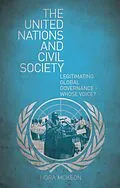The UN is able to recognize key global challenges, but beset by difficulties in trying to resolve them. In this, it represents the current global political balance, but is also the only international institution that could move it forward. Civil society can be a catalyst for this kind of change. In this book, Nora McKeon provides a comprehensive analysis of UN engagement with civil society. The book pays particular attention to food and agriculture, which now lie at the heart of global governance issues. McKeon shows that politically meaningful space for civil society can be introduced into UN policy dialogue. The United Nations and Civil Society also makes the case that it is only by engaging with organizations which legitimately speak for the 'poor' targeted by the Millennium Development Goals that the UN can promote equitable, sustainable development and build global democracy from the ground up. This book has strong ramifications for global governance, civil society and the contemporary debate over the future of food.
Autorentext
Nora McKeon studied history at Harvard University and Political Science at the Sorbonne, before joining the Food and Agriculture Organization (FAO) of the United Nations. She held positions of increasing responsibility there, culminating in overall direction of the FAO's relations with civil society. She now divides her time between writing and lecturing on development discourse, peasant farmer movements and UN-civil society relations; and coordinating an exchange programme for African and European farmers on agriculture and trade policy issues. She recently published (with Michael Watts and Wendy Wolford) Peasant Organizations in Theory and Practice (2004).
Inhalt
Part I: Setting the Stage
1. Scope and Methodology
2. A World Context in Flux: Challenges to Multilateralism and the Quest for Global Governance
3. Global Actors in Evolution: From International NGOs to Transnational Social Movements
4. Getting the Terms Straight
Part II: The FAO, Civil Society and the Global Governance of Food and Agriculture
5. Background
6. Civil Society and the World Food Summit
7. From Commitments to Action: Civil Society and the FAO on the Trail of Elusive Political Will
8. The Global Food Crisis: A Political Opportunity for Civil Society?
Part III: Comparative Look at UN-Civil Society Engagement
9. Civil Society Participation in Global Policy Forums
10. Civil Society and Summit Follow-up: Linking Global Commitments and Local Action
11. Governance of UN-Civil Society Relations: Interface Mechanisms and the Issues of Representativity, Legitimacy and Accountability
12. UN Reform Proposals, the Millennium Development Goals and Civil Society: Are We on the Right Track?
Part IV: Conclusions and Open Issues
13. Major Challenges for the United Nations in its Relations with Civil Society
14. Issues for Further Investigation
Bibliography
Annex: Cross-System Survey Responding Entities
Index
